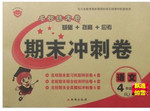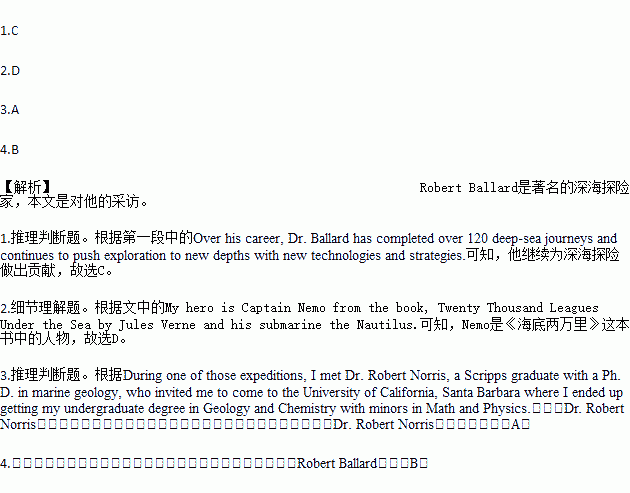题目内容
Robert Ballard is probably the most famous deep-sea explorer in the past 100 years. While he is best known for his historic discovery of the wreckage(残骸) of the R.M.S. Titanic which sank to the bottom of the sea in 1912, he also discovered the wreckage of the Bismarck and the Yorktown. Over his career, Dr. Ballard has completed over 120 deep-sea journeys and continues to push exploration to new depths with new technologies and strategies. His new high-tech Inner Space Center at the University of Rhode Island links scientists all over the world and makes it possible to identify new discoveries in realtime.
Reporter: What were you like as a kid?
Ballard: I was a very “active” kid with lots of interests including sports (football, basketball, and tennis), fishing, and studies.
Reporter: Do you have a hero?
Ballard: My hero is Captain Nemo from the book, Twenty Thousand Leagues Under the Sea by Jules Verne and his submarine the Nautilus.
Reporter: What do you daydream about?
Ballard: I dream about undersea exploration.
Reporter: How did you get into your field of work?
Ballard: It started with a scholarship to the Scripps Institute of Oceanography in La Jolla, California, in the summer of 1959 when I was a junior in high school. That summer, I went to sea on two separate expeditions in Baja California with various oceanographers(海洋学家). During one of those expeditions, I met Dr. Robert Norris, a Scripps graduate with a Ph. D. in marine geology, who invited me to come to the University of California, Santa Barbara where I ended up getting my undergraduate degree in Geology and Chemistry with minors in Math and Physics.
Reporter: What’s the best piece of advice that anyone has ever given you that you can share with us?
Ballard: Follow your dreams and don’t let anyone talk you out of them.
Reporter: Do you have any good jokes?
Ballard: I prefer sayings to jokes. My favorite is, “Never get into the thick of thin things.”
1.It can be inferred from the first paragraph that Robert Ballard ________.
A. is president of a university and travels a lot
B. is the most famous deep-sea explorer in history
C. is still contributing to the development of deep-sea exploration
D. is best famous for the discovery of the wreckages of three ships
2.From the passage we know Nemo ________.
A. is Jules Verne’s nickname B. is the name of a ship
C. is a sailor on a submarine D. is a character in a book
3.What can we know about Ballard?
A. He was lucky to meet Dr. Robert Norris.
B. He once wrote a book about the sea.
C. He loves jokes more than proverbs.
D. He used to be tired of studying.
4.What’s the passage mainly about?
A. The great achievements of Robert Ballard.
B. An interview with a famous deep-sea explorer.
C. A brief introduction to famous Robert Ballard.
D. What a famous deep-sea explorer is like.
 名校练考卷期末冲刺卷系列答案
名校练考卷期末冲刺卷系列答案
